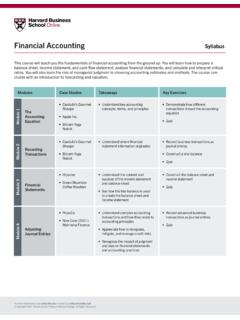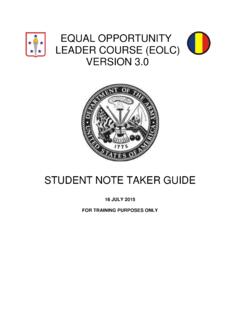Transcription of How to Become a More Effective Leader
1 How to Become a More Effective Leader Contents 3 Leadership vs. Management: What's the Difference? Effective leadership is vital to organizational success. According to a study by global consulting firm DDI, organizations with strong leadership talent outperform their competitors by: 6 Essential Leadership Skills and Qualities Acting more decisively 27 Identifying Your Navigating through complexity with greater efficiency Leadership Style Anticipating and reacting to business challenges with ease 31 Developing as a Leader Research shows that 80 percent of organizations consider leadership a high priority, but just 41 percent are ready to meet the demands of finding and 35 Your Leadership Journey developing leadership talent. Whether you're a seasoned professional or new to the workforce, you can hone your leadership skills to meet the growing demand and advance your career.
2 In this guide, you'll learn about the difference between leadership and management, uncover the qualities and skills that characterize an Effective Leader , gain an understanding of common leadership styles, and explore how you can unleash the potential in yourself and others. Leadership vs. Management: What's the Difference? Before delving into what makes an Effective Leader , it's important to understand the difference between leadership and management. While there's some overlap between the work that leaders and managers do, there are also significant distinctions. Here are three differences between leadership and management. 1. Process vs. Vision 2. Organizing vs. Aligning Effective leadership is centered on a vision to guide change. In the book, On Becoming a Leader , scholar Warren Bennis Whereas managers set out to achieve organizational goals presents a list of key differences between managers and through implementing processes, such as budgeting, leaders , including: organizational structuring, and staffing, leaders are more The manager administers; the Leader innovates intent on thinking ahead and capitalizing on opportunities.
3 The manager maintains; the Leader develops I think of management as working with other people to make sure the goals an organization has articulated are executed, The manager focuses on systems and structure; the says Harvard Business School Dean Nitin Nohria in the online Leader focuses on people course Management Essentials. It's the process of working Managers pursue goals through coordinated actions and with others to ensure the Effective execution of a chosen tactical processes, or tasks and activities that unfold over set of goals. Leadership is about developing what the goals stages to reach a certain outcome. For example, they may should be. It's more about driving change. implement a decision-making process when leading a critical meeting, or when devising a plan for communicating organizational change.
4 leaders , on the other hand, are less focused on how to organize people to get work done and more on finding ways to align and influence them. Leadership vs. Management: What's the Difference? 4. 3. Position vs. Quality BUSINESS INSIGHT: LEADERSHIP VS. MANAGEMENT. The title manager often denotes a specific role within an organization's Leadership Management hierarchy, while referring to someone as a Leader has a more fluid meaning. Purpose Dealing with change Dealing with complexity Manager is a title. It's a role and set Focus Thinking Doing of responsibilities, writes leadership coach Doc Norton in Forbes. Having Change and innovation Execution and implementation the position of manager does not make Doing the right things Doing things right . you a Leader . The best managers are leaders , but the two are not synonymous.
5 Main Formulating visions Planning projects Leadership is the result of action. If you Processes/ Aligning people Organizing people act in a way that inspires, encourages, Skills Motivating and inspiring Monitoring progress and or engages others, you are a Leader . It performance Influencing doesn't matter your title or position.. Problem-solving Leadership is a quality that needs to be shaped. Through learning how to Orientation Future Present influence others, you can build greater Long-term Short-term self-awareness and boost your team's performance. Daily Work High-level Ground-level Strategic Tactical Understanding how the work of a Seeks to Change Order Leader differs from that of a manager is Achieve Newness Consistency foundational to your leadership journey. Effectiveness Efficiency Next, you'll learn about the skills and Movement Stability qualities you need to be an Effective Leader .
6 Leadership vs. Management: What's the Difference? 5. Essential Leadership Skills and Qualities Consider the question: What defines an Effective Leader ? Effective leadership requires more than just developing your skills you also need to cultivate and maintain an environment that enables those around you to thrive. Throughout this section, you'll learn about the skills and qualities you need to drive both individual and team performance. SKILL 1: EMOTIONAL INTELLIGENCE. Emotional intelligence is the ability to understand and manage your emotions, as well as recognize and influence 1. Self-Awareness the emotions of those around you. The term was first coined Self-awareness is having a clear understanding of your in 1990 by researchers John Mayer and Peter Salovey, but strengths, limitations, emotions, beliefs, and motivations.
7 Later popularized by psychologist Daniel Goleman. It sounds simple enough, yet a survey by organizational Emotional intelligence also known as EQ is typically consulting firm Korn Ferry found that 79 percent of broken down into four core competencies: self-awareness, executives had at least one blind spot or a skill they ranked self-management, social awareness, and relationship among their strongest that others reported as a weakness. management. leaders who are adept at recognizing and managing their Research shows that 90 percent of top performers are high in emotions are better equipped to perceive others' feelings emotional intelligence. By building your EQ, you can bring out and know how to motivate employees. Those who don't the best in others and cultivate successful teams. could see a slip in performance: Research in the Harvard Business Review found that teams with individuals who lack Here are five emotional intelligence skills you need and ways self-awareness make worse decisions and are less Effective you can develop them.
8 At conflict management. Essential Leadership Skills and Qualities 7. 2. Self-Regulation Self-regulation refers to how you manage your emotions, If you acknowledge your emotions and give yourself time behaviors, and impulses. The more self-aware you are, the to process them, you can carefully craft how you respond easier this becomes. If you can recognize what you're feeling and avoid doing anything that could jeopardize the goodwill and why, you can respond appropriately. you've worked hard to build. In my experience, I've never seen the tendency toward radical outbursts to surface as an indicator of strong 3. Empathy leadership, writes Daniel Goleman, the psychologist who popularized emotional intelligence, on his website. Empathy is the capability of understanding another person's experiences and emotions, and has been ranked as the top If prone to emotional outbursts or overreacting, there are leadership skill needed today by global consulting firm DDI.
9 Tactics you can use to improve your self-regulation: According to DDI's research, leaders who excel at listening Pause before responding: Give yourself time to stop and responding with empathy perform more than 40 percent and think before immediately replying. This could be higher in coaching, planning, and decision-making. as simple as taking a deep breath and allowing for a 20-second pause so that your feelings get out of the By actively listening to your employees and taking the way of your thoughts. time to understand their wants and needs, you can boost engagement, build trust, and more effectively coach them Take a step back: Sometimes, you might need to leave through challenges. The more your team feels appreciated, the room, and that's OK. It's often better to take a walk, the more invested they'll be, which, in turn, leads to higher drink some water, or call a friend than to make a snap morale and a stronger company culture.
10 Judgment, send a scathing email, or lash out at your team. Recognize your emotions: Try jotting down what it is you're feeling and what caused the distress. You'll likely start identifying patterns. If you know what triggers you, the next time a similar situation occurs, you'll be better positioned to handle it in a healthy, positive way. Essential Leadership Skills and Qualities 8. 4. Motivation Motivation refers to your ability to inspire both yourself and BUSINESS INSIGHT. others to action. Here, it's essential to lead by example. How to Develop Emotional Intelligence Skills Self-motivated leaders care more about hitting organizational milestones than monetary awards. They set goals, take initiative, rise to the challenge, and stay optimistic during Try Journaling At the end of the workday, reflect on how your turbulent times.










